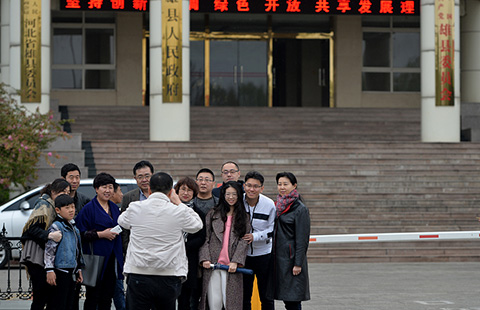Top grossing Chinese film sets a record
|
 Xu Zheng (left) and Wang Baoqiang performing in Lost in Thailand, the highest-grossing Chinese film with record ticket sales hitting 1.26 billion yuan ($202 million). They starred in both Lost on Journey and Lost in Thailand. Now the producers of the latter face an intellectual property right lawsuit. [Photo/Provided to China Daily]
|
While the low-budget comedy Lost in Thailand has created a record in ticket sales among China's home-made film productions, it might produce another record, but in a negative way, especially for its producer - Beijing Enlight Media Co.
Wuhan Hua Qi Film & TV Production Co filed a lawsuit against Beijing Enlight Media in early March, claiming that it infringed the copyright of Wuhan Hua Qi's film Lost on Journey. It is claiming compensation of 100 million yuan ($16 million), probably the highest figure in an intellectual property infringement case in the film industry in China.

The plaintiff is a company registered in 2007 with a registered capital of 10 million yuan, according to information on its rough and ready website.
A total of four companies have been sued including Beijing Enlight Media. They are all producers of the film Lost in Thailand. Wuhan Hua Qi charged them with illicit competition and copyright infringement.
"Practitioners in the film industry have relatively weak awareness of intellectual property rights protection and very few companies would equip themselves with a complete team of lawyers in a film project or seek professional legal advice in advance," said Shen Zheyan, a cultural industry consultant with the Shenzhen-based CIC Industry Research Center.
"In general, they would resort to legal approaches to safeguard their legal rights after the infringements have taken place, which is liable to cause many legal disputes," he added.
In the civil complaint which Enlight Media has received from the Beijing High People's Court, Wuhan Hua Qi said Enlight Media carried out misleading promotions for Lost in Thailand on purpose, causing people to believe that Lost in Thailand is the sequel to Lost on Journey in an explicit or implicit way, according to the statement released by Enlight Media on March 7.
Lost on Journey is a comedy released in 2010. It earned about 50 million yuan in box office revenues. Hua Qi believes that Enlight Media has benefited from misleading audiences about the relationship of the two films and it pointed out in the complaint that Enlight Media's shares soared during the period when Lost in Thailand was being shown in cinemas. It had taken 538 million yuan in revenues from the movie by the end of Jan 27, 43 percent of its total ticket sales. The remaining 57 percent was distributed among other interested parties including the theaters.
Wuhan Hua Qi said in the complaint that a comparison shows the two films have many fundamental similarities, including their names, plots and actors' lines, that infringed the copyright of the original production. Xu Zheng and Wang Baoqiang starred in both of the films.
"Whether Hua Qi will win the lawsuit depends on the evidence it can offer but, normally speaking, the indemnity for copyright infringement is less than 1 million yuan in China," said Liu Yongpei, a director and partner in the intellectual property department of Yingke Law Firm's Shanghai Office.
If the evidence proves that Enlight Media's actions have caused Hua Qi losses or Enlight Media has benefited from what it has done, and at the same time the evidence is approved by the court, the compensation is allowed to exceed 1 million yuan, said Liu.
"The point is it's very hard to prove the correlation between the two issues. It is almost impossible," Liu added.
As a listed media and entertainment company, Enlight Media predicted that its net profit in the first quarter was between 76.89 million yuan and 82.8 million yuan, up between 290 percent and 320 percent year-on-year.
It contributed the significant growth to the rosy box office performance of the low-budget comedy Lost in Thailand in the period. It premiered on Dec 12. The film has become the highest-grossing Chinese film on the mainland to date with record ticket sales of 1.26 billion yuan, according to EntGroup Consulting, a Beijing-based entertainment industry consultancy firm.
China's national box office revenues reached 17.07 billion yuan last year, according to the State Administration of Radio, Film and Television, which was merged with the State Press and Publication Administration to become a new administration in March.
Enlight Media accounted for 9.4 percent of the movie market nationwide in 2012, following Huayi Brothers Media Group, which had a 12.4 percent share with annual box office receipts of 2.1 billion yuan.
The company earned 1.03 billion yuan in revenue last year, posting a year-on-year growth of 48.13 percent.
Its net profits increased by 76.47 percent year-on-year to reach 310 million yuan, according to its financial report. In the first three quarters, Enlight Media's net profit amounted to only 136.29 million yuan. Lost in Thailand is estimated to have contributed a net profit of more than 150 million yuan in the fourth quarter.
Intellectual property rights protection plays a significant role in the development of the film industry because it can strengthen the profitability of original-movie companies, which is helpful to improving the creativity of domestic movies, diversifying the content of films, Shen said.
The bad effect it might bring to the industry is that some enterprises would attack their rivals in the name of copyright protection, he said. "But, in general, it does more good than harm to the sector."
Liu said: "In some similar cases, the plaintiffs simply want to save money for marketing and promotion and they think a lawsuit would attract much more attention from the public easily and quickly at a low cost."
A new derivative products market could be exploited in the industry if more importance could be attached to the protection of intellectual property rights, Liu said.
For example, film companies could license the broadcasting rights to TV stations, the information network dissemination rights to online video websites and the copyrights to toy manufacturers, he explained.
CEO and President of Enlight Media Wang Changtian said Enlight Pictures, a subsidiary wholly owned by the company, is expected to further invest in film productions and the distribution business in the next two years. The revenue generated from the film arm would account for more than half of the company's total revenues.
In response to the lawsuit, Enlight Media said Lost in Thailand was a film approved for shooting and releasing by SARFT and is protected by law. It said it will reserve the right to counterclaim.
Liu said he expects the case will take more than a year to resolve.
- 'Lost in Thailand' film boosts Thai tourism
- Bona Film reports revenue growth
- Chow film's revenue hit 990 million yuan
- Laughs give China's film market a boost
- No quota limit over Taiwan film imports
- Imported films steal the show at nation's cinemas
- Foreign films lead Chinese box office
- Blockbuster film nears mainland box office record















